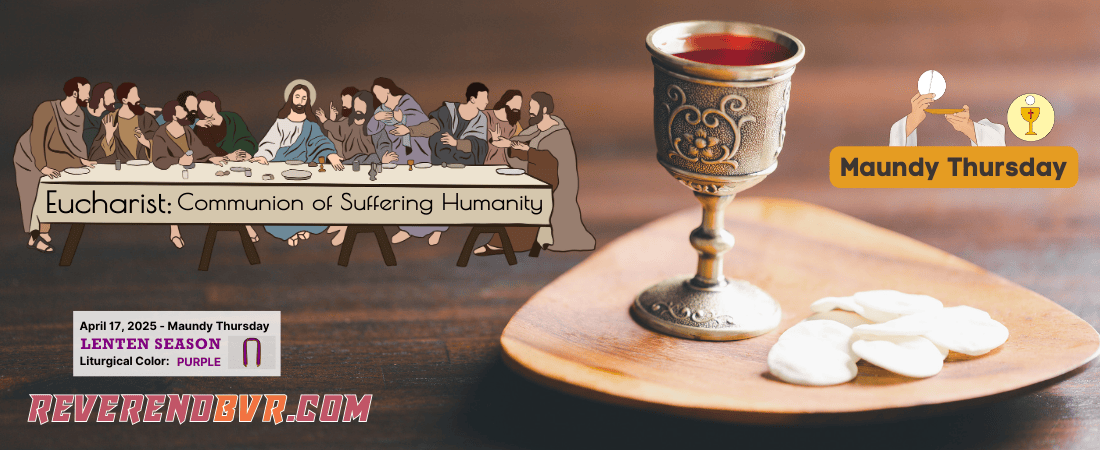April 17, 2025 – Maundy Thursday – Bible Readings:
• Exodus 12:1-7 • Psalm 116
• 1 Corinthians 11:23-34 • Mark 14:17-25
On this Maundy Thursday, we pause and reflect on the depth of the Eucharist, also known as the Lord’s Supper. The institution of communion on the night before Jesus’ crucifixion is not just a tradition but a profound reminder of God’s love, sacrifice, and the deep communion between suffering humanity and the divine. It invites us into the heart of God’s story—the intersection of suffering and redemption—and calls us to participate in it, not only as a ritual but as a living reality in our lives today.
- The Passover: A New Beginning (Exodus 12:1-6)
The events leading up to the Last Supper occur during the Passover, a time when the people of Israel remembered their miraculous deliverance from Egypt. But on this particular night, Jesus reinterprets the traditional Passover elements, pointing to a new reality—the ultimate deliverance, not from physical slavery, but from the slavery of sin.
When God commanded Israel to start their calendar anew with the month of their deliverance (Exodus 12:1-6), He made an extraordinary declaration: The past would no longer define them. The future, marked by God’s redemptive work, would be the new beginning. Jesus, in the same spirit, tells His disciples that His body, broken for them, and His blood, shed for them, inaugurate a new covenant that will change everything. A new beginning.
2. The Eucharist: A Communion of Suffering and Redemption (1 Corinthians 11:23-26)
The Eucharist is a deeply intimate act with roots in the Jewish tradition of Passover (Pesach), which commemorates God’s deliverance of the Israelites from Egyptian bondage. On the night of His betrayal, Jesus chose to celebrate the Passover with His disciples, but He redefined its meaning. The bread and wine, once symbols of the Passover lamb’s sacrifice, now represent Jesus’ body and blood, sacrificed for our ultimate deliverance from sin and death. In this act, Jesus became the true Paschal Lamb, whose death fulfilled the ancient promise of redemption.
The broken bread symbolizes more than His physical suffering; it also represents His emotional, spiritual, and relational agony. The poured wine signifies His blood, which sealed the new covenant and demonstrates His solidarity with human suffering.
3. Historical Importance of the Eucharist:
Instituted by Jesus during the Passover, the Eucharist holds profound theological significance. The word “Eucharist” comes from the Greek Eucharisteo, meaning “to give thanks,” reflecting a deep acknowledgment of God’s grace and mercy. Through the elements of bread and wine, Jesus invites us to participate in the mystery of His death and resurrection. As we partake in the bread and wine, we proclaim the grace of God and the sacrifice of Jesus, fulfilling the meaning of the Passover meal, symbolizing His body broken and His blood shed for us.
The Eucharist calls us into communion with Christ, not merely to remember, but to enter fellowship with Him in His suffering. By partaking, we participate in His life, death, and resurrection, and we are invited to align our own suffering with His. As Paul writes in 1 Corinthians 11:23-26, the Eucharist is a proclamation of His death until He returns. This sacrament connects us to the past, present, and future of God’s redemptive story. It is not a passive act but an invitation to actively participate in His ongoing work of salvation.
4. The Call to Reflect and Prepare (1 Corinthians 11:27-28)
Before we partake in communion, we are called to examine ourselves (1 Corinthians 11:27-28). This examination is not about guilt or shame but about honest reflection—are we aligning ourselves with the truth of what Jesus has done for us? Are we living in the light of the new covenant, where sin is forgiven, God’s law is written on our hearts, and we have access to the very presence of God?
Self-examination leads to transformation. When we come to the table, we bring our pain, our wounds, our brokenness, and we offer them to Christ, knowing that in communion, He can heal, restore, and transform us. Communion isn’t just about remembering Jesus’ suffering; it’s also about inviting His healing power into our lives, especially in times of pain or struggle.
5. The New Covenant: Inner Transformation (Mark 14:24)
When Jesus speaks of the cup as “the new covenant in My blood” (Mark 14:24), He is not just establishing a new ritual. He is offering us a radically new relationship with God. No longer do we need sacrifices of animals to cover our sins; Jesus’ blood takes care of that once and for all. His sacrifice offers us forgiveness, but it also offers us a new life—a life where God’s laws are written on our hearts, where we have a personal relationship with God, and where the Holy Spirit empowers us to live in holiness.
This new covenant is the foundation of our hope. When life feels overwhelming and we face challenges that seem impossible, we remember the new covenant—God is with us, and He has given us His Spirit to endure and overcome.
6. The Hope of the Kingdom (Mark 14:25, Revelation 19:9)
But communion also points forward. Jesus’ words in Mark 14:25— “I will not drink again of the fruit of the vine until that day when I drink it new in the kingdom of God”—are a powerful reminder of our hope. As we partake in communion, we are not only remembering Jesus’ death and proclaiming it to the world, but we are also looking forward to the great wedding feast of the Lamb, where Jesus will drink the wine again with us, His bride, in the kingdom of God (Revelation 19:9).
This promise fills us with hope. Even in our present suffering, we can find joy in the knowledge that the pain is temporary, and the glory that is to come will far outweigh it.
7. The Eucharist in Our Lives
As we reflect on the Eucharist, we are reminded that it is not only a ritual to be observed once a month or during special occasions. It is a continuous call to embrace the cross, to live in the power of Christ’s suffering and resurrection, and to be agents of reconciliation in a broken world. The Eucharist, in all its depth, invites us to live out its truth in our daily lives—through love, service, and sacrificial living.
As we share in communion, we are also called to share in each other’s burdens, to live out the communion of suffering humanity that Christ established. When we experience suffering or pain, we are not alone; we have Christ and each other. And in the midst of that suffering, we find hope, healing, and the promise of resurrection.
Let us Pray: Heavenly Father,
We come before You today, remembering the sacrifice of Your Son, Jesus Christ. As we partake in this holy meal, we ask You to open our hearts and minds to the depth of what it means to commune with You through the Eucharist. Help us to remember Jesus’ body broken for us and His blood poured out for us. May we not only reflect on His suffering but also align our lives with His sacrificial love.
Lord, in our own suffering, help us to find communion with You. May we find the strength to endure through the new covenant You have established, and may we look forward with hope to the day when we will feast with You in Your Kingdom.
We pray for transformation in our lives, that as we partake in this holy communion, we may be made more like You—full of love, grace, and mercy.
In Jesus’ name, we pray.
Amen.
Bibliography and Bible References:
- Exodus 12:1-6 – The institution of Passover.
- 1 Corinthians 11:23-34 – Paul’s instructions on the Lord’s Supper.
- Mark 14:17-25 – The Last Supper and Judas’ Betrayal.
- John 6:51 – Jesus as the bread of life.
- Jeremiah 31:33-34 – The promise of the new covenant.
- Revelation 19:9 – The marriage supper of the Lamb.
- Hebrews 10:19-22 – The new and living way through Christ’s body.
Sermon in Brief Points:
- Passover as a New Beginning: The Eucharist fulfills the promise of deliverance, offering freedom from sin through the sacrifice of the Lamb.
- A Communion of Suffering and Redemption: In the Eucharist, we participate in Christ’s suffering and find healing, aligning our struggles with His.
- Self-Examination: Communion calls us to reflect on our lives, offering our brokenness to Christ for healing and transformation.
- The New Covenant: Jesus’ blood establishes a new relationship with God, empowering us to live holy lives through the Holy Spirit.
- Hope of the Kingdom: Communion is a foretaste of the eternal feast with Christ in His Kingdom, filling us with hope in our suffering.
- Living Out the Eucharist: The Eucharist compels us to live sacrificially, serving others and sharing in the suffering and redemption of the world.
May this reflection deepen your understanding of the Eucharist, bringing it to life in your own faith journey and encouraging you to live out the love and sacrifice of Christ each day.

